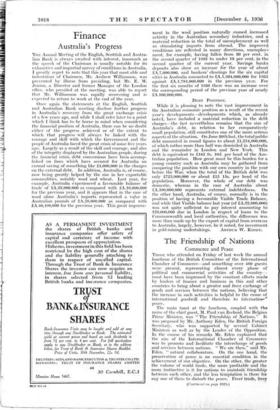Australia's Progress
Finance
THE Annual Meeting of the English, Scottish and Austra- lian Bank is always awaited with interest, inasmuch as the speech of the Chairman is usually notable for its exhaustive and impartial survey of conditions in Australia. I greatly regret to note that this year that most able and industrious of Chairmen, Mr. Andrew Williamson, was prevented by illness from presiding, but Mr. E. M. Janion, a Director and former Manager of the London office, who presided at the meeting, was able to report that Mr. Williamson was rapidly recovering and is expected to return to work at the end of the year.
Once again the statements at the English, Scottish and Australian Bank meeting disclose further progress in Australia's recovery from the great exchange crisis of a few years ago, and while I shall refer later to a point which I think has to be borne in mind when considering the financial position of Australia, there can be no doubt either of the progress achieved or of the extent to which that progress will always be linked with the courage and skill with which the Government and the people of Australia faced the great crisis of some five years ago. Largely as a result of the skill and courage, and also of the integrity displayed by the Australian people, during the financial crisis, debt conversions have been accomp- lished on lines which have secured for Australia an annual saving of something like £4,000,000 in the charges on the external debt. In addition, Australia is, of course, now being greatly helped by the rise in her exportable commodities, notably wool and wheat. Last year, for example, Australia experienced a favourable balance of trade of £A.22,000,000 as compared with £A.16,000,000 for the previous year, and it appears that in the case of wool alone Australia's imports represented a value in Australian pounds of £A.58,000,000 as compared with £A.40,400,000 for the previous year. This great improve- ment in the wool ,position naturally ,eaused increased activity in the Australian secondary industries, and a material reduction in the total of unemployment as welt as stimulating imports from abroad. The improved conditions are reflected in many directions, unemploy-: ment, Tor example, having fallen from 30 per cent. in the second quarter of 1932 to under 18 per cent. in the second quarter of the current year. Savings banks deposits also show an increase for the year of about £A.7,000,000, and bankers' clearings for the six capital cities in Australia amounted to 1A.1,934,000,000 for 1985 against £A.1,784,000,000 in the previous year. For the first six months of 1936 there was an increase over the corresponding period of the previous year of nearly. £A.100,000,000. '
• DEBT POSITION.
While it is pleasing to note the vast improvement in the Australian economic position as a result of the recent year's developments—developments which, as already noted, have included a material reduction in the debt charges—the fact nevertlieless remains that the size of Australia's debt, in relation to her comparatively. small population, still constitutes one of the more serious aspects of the situation. On June 30th last, the total public debt amounted in round figures to about £1,254,000,000, of which rather more than half was domiciled in Australia and the remainder in London and New York. This debt is equivalent to £185 2s. 10d. per head of the Aus- tralian population. How great must be this burden for a young country such as Australia may be gathered from comparing the position with our own country in the year before the War, when the total of the British debt was only £725,000,000 or about £15 15s. per head of the population. Moreover, the whole of our debt was domestic, whereas in the case of Australia about £A.590,000,000 represents external indebtedness. On the other hand, Australia, of course, normally is in the position of having a favourable Visible Trade Balance, and while that Visible balance last year (of £A.22,000,000) was not quite sufficient to pay interest amounting to £23,000,000 due in London in respect of loans to the Commonwealth and local authorities, the difference was more than made up by the export of capital from overseas to Australia, largely, however, be it noted, for investment in gold-mining undertakings. ARTHUR W. KIDDY.




















































 Previous page
Previous page